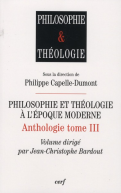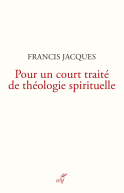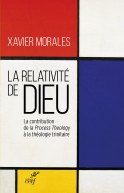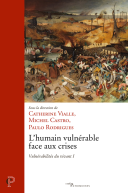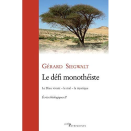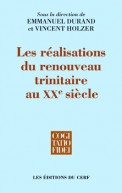L'Être et le bien - CF 281
de Yves Meessen
Collection Cogitatio Fidei - N° 281
240 pages - sept. 2011
27,50€
Dans la tradition théologique, tantôt l'être est identifié au bien (Augustin), tantôt le bien se situe au-delà de l'être (Denys). Ces deux postures métaphysiques ont convergé dans deux pensées différentes de l'« analogia entis » (Thomas d'Aquin et Maître Eckhart). Parcourir ces grandes pensées selon une relecture phénoménologique fait surgir la problématique d'une méprise sur le sens de l'être : « Y aurait-il deux manières de considérer l'être, l'une où l'être serait quelque chose qui nécessiterait un geste antérieur de donation, l'autre où l'être serait lui-même donation et bonté ? » Le défi heideggérien pousserait la théologie vers une question fondamentale. Y répondre, ce serait, d'une part, mettre au jour le présupposé sur lequel est fondé la critique de l'onto-théologie et, d'autre part, par une remise en question de la « déconstruction » ("Destruktion"), laisser émerger une construction métaphysique entièrement transformée par la Révélation. Pour opérer cette entreprise, le chemin est déjà balisé du côté phénoménologique par les travaux de Paul Ricœur, Jean-Luc Marion et Michel Henry. Leurs études sont stimulantes pour la théologie dont le point de vue est cependant différent. Comme Jean-Yves Lacoste le fait remarquer, considérer la Révélation comme un fait (théologie), et non comme une possibilité (philosophie), ouvre une intentionnalité qui donne accès à une autre description des phénomènes et, par là, à une nouvelle herméneutique. Par conséquent, la foi permet une pensée de l'être impensable sans elle. La Révélation provoque à penser une différence ontologique où l'être ne se retire pas dans sa donation. Cette logique est surprenante au regard de la pensée de Heidegger. Elle se propose comme une alternative à la logique de l'« alètheia ».
--
In theological tradition, the being is sometimes identified with good (Augustine), sometimes good is situated beyond the being (Denys). These two metaphysical views converged in two different philosophies of “analogia entis” (Thomas Aquinas and Master Eckhart). A phenomenological reading of these two philosophies reveals the problematic of the meaning of the word being: “Could there be two ways to consider the being, one where being is something that requires an inner gesture of donation, the other where being is itself a donation and goodness?” The Heideggerian challenge obliges theology to answer that fundamental question. To do so would mean, on the one hand, laying bare a presupposition on which the critique of onto-theology is founded, and on the other, calling “destruction” (Destruktion) into question, so permitting a metaphysical construction entirely transformed by the Revelation to emerge. To undertake this challenge, the way is already marked out on the phenomenological side by the works of Paul Ricœur, Jean-Luc Marion and Michel Henry. Their studies are stimulating for theologians although their viewpoint is different. As Jean-Yves Lacoste points out, to consider the Revelation as a fact (theology), and not as a possibility (philosophy), opens up an intentionality that gives access to another description of phenomena and, in this way, to new hermeneutics. Consequently, faith permits us to think the being in a way that is unthinkable without it. The Revelation inspires us to observe an ontological difference wherein the being does not withdraw from its donation. This idea is surprising in view of Heidegger’s thinking. It is presented as an alternative to the logic of “aletheia”.
--
In theological tradition, the being is sometimes identified with good (Augustine), sometimes good is situated beyond the being (Denys). These two metaphysical views converged in two different philosophies of “analogia entis” (Thomas Aquinas and Master Eckhart). A phenomenological reading of these two philosophies reveals the problematic of the meaning of the word being: “Could there be two ways to consider the being, one where being is something that requires an inner gesture of donation, the other where being is itself a donation and goodness?” The Heideggerian challenge obliges theology to answer that fundamental question. To do so would mean, on the one hand, laying bare a presupposition on which the critique of onto-theology is founded, and on the other, calling “destruction” (Destruktion) into question, so permitting a metaphysical construction entirely transformed by the Revelation to emerge. To undertake this challenge, the way is already marked out on the phenomenological side by the works of Paul Ricœur, Jean-Luc Marion and Michel Henry. Their studies are stimulating for theologians although their viewpoint is different. As Jean-Yves Lacoste points out, to consider the Revelation as a fact (theology), and not as a possibility (philosophy), opens up an intentionality that gives access to another description of phenomena and, in this way, to new hermeneutics. Consequently, faith permits us to think the being in a way that is unthinkable without it. The Revelation inspires us to observe an ontological difference wherein the being does not withdraw from its donation. This idea is surprising in view of Heidegger’s thinking. It is presented as an alternative to the logic of “aletheia”.
- Dimensions : 135x215x15
- ISBN : 9782204095020
- Poids : 320 grammes
Avec la collaboration de : Jean-Yves Lacoste
DU MÊME AUTEUR
> VOIR TOUS LES LIVRES DE l'AUTEUR
DANS LA CATÉGORIE
L'humain vulnérable face aux crises
Vulnérabilité du vivant I
de Michel Castro ,Catherine Vialle ,Paulo Rodrigues
206 pages - juil. 2023
Les Réalisations du renouveau trinitaire au XXe siècle - CF 273
352 pages - avril 2010


